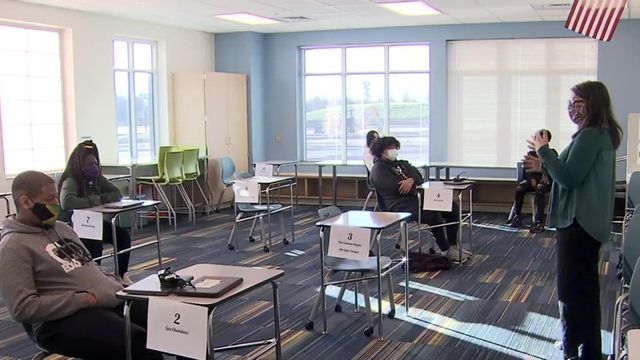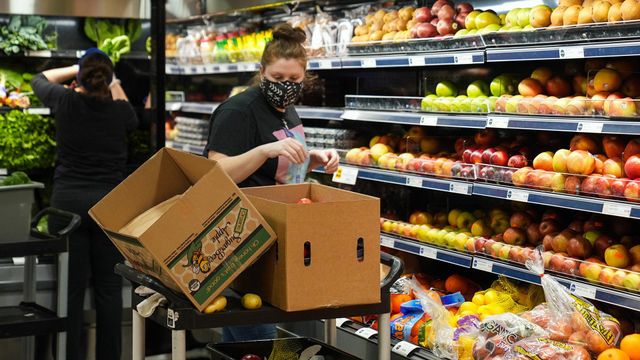NC teachers eligible for vaccinations in 2 weeks
With the push on to reopen schools across North Carolina, teachers are being given a higher priority to get vaccinated against coronavirus.
Posted — UpdatedGov. Roy Cooper said Wednesday that all K-12 school personnel and anyone who works in child care will be eligible for vaccinations beginning Feb. 24. All other frontline "essential" workers, such as police officers, firefighters and grocery workers, will have to wait until March 10 to start getting vaccinated.
The state has administered nearly 1.5 million shots over the past two months, meaning about 10.6 percent of state residents have had at least one dose of the two-dose regimen. About 3.5 percent of the state is fully vaccinated.
Subdividing Group 3 in the state's vaccination priority list is necessary, the governor said, to balance the limited supply of vaccine with the large number of frontline workers in the state.
North Carolina receives only 150,000 doses of vaccine each week from the federal government, and the state has about 240,000 public school personnel.
Previously, state officials said they had no plans to break Group 3 into smaller units and prioritize some professions over others. But Cooper said putting teachers at the front of Group 3 was simply pragmatic.
"There has been concern about all of these essential frontline workers in a big group, in Group 3, all of a sudden crashing into the system, that that would be problematic," he said. "Starting with a smaller number of Group 3 frontline essential workers helps providers streamline vaccine distribution."
Group 3 could be further subdivided in the coming weeks, depending on the flow of vaccine into the state, the governor said.
"This essential worker category is much more complicated because it's a lot of people who are doing very important frontline jobs," he said. "The [state's] health care team is going to look at ... whether they can open up all of the [Group 3] categories or whether they have to go to another subpart."
Dr. Mandy Cohen, secretary of the state Department of Health and Human Services, said the prospect of a third vaccine being approved in the coming weeks could allow the bulk of Group 3 to be eligible at the same time without breaking out other professions separately.
"We really have to look at the supply to meet the demand that is out there," Cohen said.
Micki McCarthy, manager of Weaver Street Market in Raleigh, said her staff is excited to know they'll soon be eligible for vaccination.
“It is all the buzz," McCarthy said with a laugh. "It will give us peace of mind to know we serve our community every day without the fear of contacting the virus ourselves."
Cooper and Cohen repeatedly stressed that research has shown schools can safely reopen if masks and other safety protocols are followed. So, vaccinating teachers and other school staff isn't a prerequisite for reopening, they said.
"Schools can get students back in the classroom safely right now, and that's what I want them to do," Cooper said.
But teachers have pushed back in recent days, saying they didn't want to put themselves and their families at risk of contracting COVID-19.
"Yes, the data is showing that transmission is low in schools, but you still can transmit in the schools," said Michelle Burton, an elementary school librarian and president of the Durham Association of Educators.
Burton's group was one of many educational organizations lobbying for higher vaccination priority for school personnel.
Burton lives with her elderly father, who has diabetes, and she said she worries she could infect him. Getting vaccinated will add protection for him as well as her, she said.
She said those who think teachers just don't want to go back into schools are wrong.
"We want to teach our students. We want to be with them. We want to see their faces," she said. "But the thing is, we just want to make sure we’re safe, and we want to protect the safety of our students and protect the safety of our colleagues who we work with every day."
Announcing the timeline for vaccinating educators, followed by other frontline workers, gives counties and health care providers another two weeks to vaccinate as many people in Group 1 (health care workers) and Group 2 (people ages 65 and up) as possible before the next group begins, the governor said.
Vaccinating people 65 or older is "critical," he said, noting that that age group accounts for more than 80 percent of North Carolina's virus-related deaths.
Cohen warned, however, that the Feb. 24 and March 10 eligibility dates don't necessarily mean that people will start getting shots then. Some counties have lengthy waiting lists of people in Group 1 or group 2 still waiting for their shots – Wake County's list has more than 80,000 people, for example – so teachers and other frontline workers will have to wait their turn, she said.
"Just being thought about and being made a priority, that’s just the first step, the right step to make," Burton said.
• Credits
Copyright 2024 by Capitol Broadcasting Company. All rights reserved. This material may not be published, broadcast, rewritten or redistributed.






